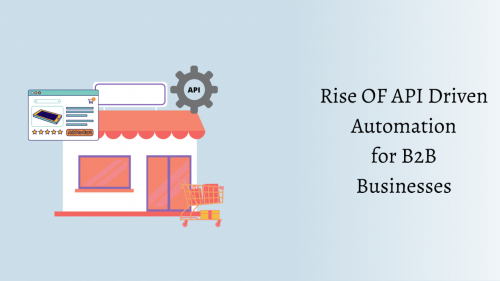Best Source for B2B Industry Trends, News and Updates

The transition to API autmoation for B2B E-Commerce business is quite challenging for B2B merchants. As they have been operating in their normal ways for years and were able to stay afloat. But, operating their B2B stores online can often become an overwhelming task for them. As it requires merchants to find business-specific solutions to cater to their business needs.
But despite the challenges, recently the eCommerce industry has seen a huge rise in the amount of B2B businesses operating online. This huge shift in the way B2B businesses operate can be traced to the rise of API-driven commerce. The use of APIs can easily help merchants in taking their business operations online with less friction.
Before we dive into how APIs are supporting the B2B eCommerce businesses to thrive, let’s understand a little about APIs. APIs are also known as application programming interfaces. Merchants can use APIs to connect programs, codes, or modules with one another. With APIs, merchants can share across required instructions and data between different programs.
APIs can be efficiently used in eCommerce to improve the overall functionality of any application. Below is a list of benefits of using APIs in eCommerce:

B2B merchants can use APIs in many ways to improve their business. These businesses can be of any domain. From furniture tables to cosmetics, APIs are helpful everywhere. As the APIs are capable of providing more flexibility, improved automation, and performance to the merchants. Hence the APIs are a perfect tool for making B2B online operations frictionless. To achieve this, B2B merchants can adapt to the following API-powered solutions for their business with the help of eCommerce development services:
B2B sellers come from a variety of business niches and industries. The product catalog of every second B2B merchant is entirely different from one another. This is quite different from the general B2C merchants. Hence, creating a suitable UI with the premade themes available is almost impossible for B2B merchants.
B2B merchants can adapt to Headless architecture. Famous eCommerce platforms such as Shopify and Magento support its implementations. With Headless Architecture, merchants can build a suitable UI for their store. B2B merchants can use technologies such as React.js, Vue.js, and Angular to build their storefront. Further, they can attach this UI with any eCommerce backend using suitable APIs.

The ancient ways of B2B business management possess a number of tasks that had to be processed manually. This made the whole business management prone to errors. As a result, it ultimately affected the quality of services provided by the merchants.
To avoid facing such issues arising from manual operations, B2B merchants can automate their majority of tasks. For this, merchants can integrate eProcurement platforms. These platforms are capable of communicating with the eCommerce backend using APIs.
eProcurement Platforms provides specific services to online merchants. These services include operations such as inventory tracking, order management, and supplier management. With the help of third-party integration, merchants can integrate any eProcurement platform of their choice with the eCommerce backend.
These integrations can easily assist merchants in improving their overall business process. As it can improve the productivity, accuracy, and speed of business operations
eCommerce has the potential to make a B2B business thrive in its full potential. However, using an eCommerce platform as a support to improve overall profits and sales for B2B business can be quite overwhelming. As the eCommerce platforms often fail to provide custom solutions to cater to unique business operation needs.
But with the use of API-driven automation and UI development, B2B merchants can easily make their business thrive online. Hence, we can conclude that “with the use of APIs available in the market to support eCommerce functionalities merchants can easily cater to their B2B business needs and thrive online”.